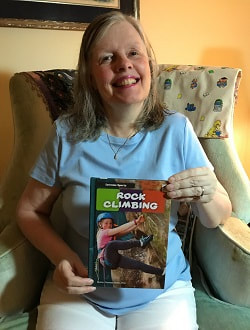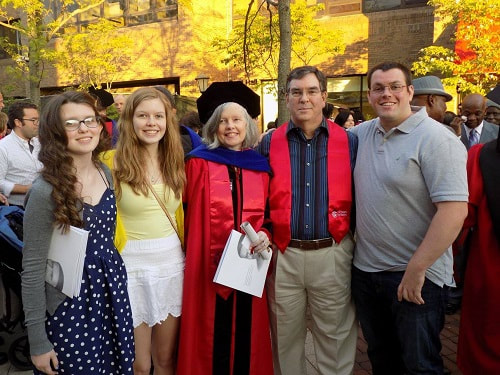Career Journey
Marie-Therese Miller Moves into Midlife Meeting Her
Long-Held Doctoral Dream
September 2021
Marie-Therese Miller
Earning a degree in mid-life may seem daunting, but according to Maryville University, studies show that people who have a college degree tend to live longer, a likely outcome of educated adults’ common choice to embrace healthy lifestyles. Another point is that having a higher education often has a positive impact on mental health and a person’s financial earnings.
In fact, the U.S. Bureau of Labor Statistics reports “the more you learn, the more you earn.” Those with a doctorate degree had median weekly earnings of $1,885 in 2020, which was $580 more per week than those with a bachelor’s degree and over $1,100 more than people with a high school diploma.
In fact, the U.S. Bureau of Labor Statistics reports “the more you learn, the more you earn.” Those with a doctorate degree had median weekly earnings of $1,885 in 2020, which was $580 more per week than those with a bachelor’s degree and over $1,100 more than people with a high school diploma.
Beyond that, the unemployment rate of doctorate holders last year was 2.5 percent, versus 5.5 percent for those with a bachelor’s degree and 9.0 percent for high school graduates.
These are all powerful incentives for attaining a higher degree.
Karen Shan, associate editor, spoke with Mid-Hudson Valley resident Marie-Therese Miller about how she earned her doctorate degree in her mid-50s, along with the impact it has made on her life.
You recently received your doctorate, but it was decades after having earned your bachelor’s degree. Why at this stage in life?
I graduated from Manhattanville College with my bachelor’s in psychology more than forty years ago. My original plan was to attend St. John’s University to pursue my doctorate in the graduate psychology department that my dad co-founded. Instead, a handsome and wise West Point cadet married and whisked me away to exotic Ft. Sill, Oklahoma and Ft. Carson, Colorado, where we started our family.
These are all powerful incentives for attaining a higher degree.
Karen Shan, associate editor, spoke with Mid-Hudson Valley resident Marie-Therese Miller about how she earned her doctorate degree in her mid-50s, along with the impact it has made on her life.
You recently received your doctorate, but it was decades after having earned your bachelor’s degree. Why at this stage in life?
I graduated from Manhattanville College with my bachelor’s in psychology more than forty years ago. My original plan was to attend St. John’s University to pursue my doctorate in the graduate psychology department that my dad co-founded. Instead, a handsome and wise West Point cadet married and whisked me away to exotic Ft. Sill, Oklahoma and Ft. Carson, Colorado, where we started our family.
|
Marie-Therese with her Family at the Bronx Zoo
|
After 16 years of cozily reading to my kids, I decided to attempt to write children’s books. I returned to my alma mater and completed my master’s in writing. For the next 16 years, I wrote about family and health topics for magazines and newspapers, stories for the Chicken Soup for the Soul anthologies, and my first seven nonfiction children’s books.
I still dreamed of earning my doctorate. My oldest daughter, [former] college roommate, and brother-in-law were all doctoral candidates, and that spurred me to do some serious investigation into doctoral offerings. St. John’s University had an English doctoral program that meshed perfectly with my goals; it included literature study, creative writing and teaching. When I graduated in 2016 at the age of 56, I realized my educational life had come full circle: I had earned my Ph.D. from St. John’s at last. Congratulations! What were the specifics involved in earning your Ph.D.? For instance, were you looking for a specific program? Was it important to have an in-class experience? |
I loved attending in-person classes at St. John’s. The drive to Queens [where the school is located] made me feel independent and cosmopolitan. I felt at home on the campus. My doctoral cohort consisted of enthusiastic and sharp-minded scholars. Most of them were 20 years younger than I was, but there were a few women my age who were also returning to school after raising families. The professors were inspiring academics of excellence.
|
As a married mom of a handful of kids, what was it like to earn your doctorate while balancing your family and home life?
I started my doctorate when my five kids were at various stages. My oldest two daughters were in graduate school, my son was in college, and my younger two daughters were in high school and middle school, respectively. On my first day, I was nervous. I wasn’t sure I could do it. My second daughter gave me a verbal shove, saying, ‘Are you kidding me? Get in your car and go right now!’ So, I did. Over the years of study, my husband was supportive and stepped in to help in all aspects of home life. The kids listened patiently, whether I was praising James Thurber’s humor or griping about writing a 30-page research paper. My computer-savvy son even formatted my dissertation. On graduation day, the family rightly came to celebrate with me. It truly was a joint accomplishment. That’s wonderful. You’ve worked as an adjunct professor before and after earning your doctorate. Has that distinction made a difference in your teaching? |
Marie-Therese celebrates her doctorate in English
from St. John’s University with Her Family |
Actually, both of my parents were college professors; however, I am such an introvert that I never imagined that teaching would be a good match for me. But I love it! The students are enthusiastic and insightful. They energize me.
My first experience as an adjunct instructor was teaching global literature at St. John’s, where some of my professors and fellow students with teaching experience acted as my mentors. St. John’s has a diverse student body, which I enjoyed. Then, I taught writing at the Culinary Institute of America (CIA). The students at the CIA are a lovely mix of young college students and people coming back to school after gaining work and life experience. My courses there were filled with lively discussions.
For the last five years, I have been an adjunct instructor solely at Marist College. Over these years, the heads of the English department have been encouraging. I teach Writing for College and Religious Themes in Literature. My most recent course is Children’s and YA Literature, where I think my perspective as a writer for children and teens adds a richer dimension for my students.
My first experience as an adjunct instructor was teaching global literature at St. John’s, where some of my professors and fellow students with teaching experience acted as my mentors. St. John’s has a diverse student body, which I enjoyed. Then, I taught writing at the Culinary Institute of America (CIA). The students at the CIA are a lovely mix of young college students and people coming back to school after gaining work and life experience. My courses there were filled with lively discussions.
For the last five years, I have been an adjunct instructor solely at Marist College. Over these years, the heads of the English department have been encouraging. I teach Writing for College and Religious Themes in Literature. My most recent course is Children’s and YA Literature, where I think my perspective as a writer for children and teens adds a richer dimension for my students.
|
|
You’ve authored more than two dozen nonfiction books for children, teens and adults. Has earning your doctorate affected your work as a book author?
I am thankful to say that after earning my doctorate and returning to nonfiction children’s writing, I have had 14 additional books published, with more waiting in the wings. I believe my doctoral studies, particularly writing my dissertation about [humorist, author, playwright, and journalist] James Thurber, made me a more expert researcher. I think my publishers find this to be an advantage. In addition, I have a few academic pieces that have been published about Thurber and on the art of researching. Has having your doctorate changed how you feel about yourself? What about your professional life? Honestly, I am proud of myself. As one of my fellow students said, getting your doctorate is like running a marathon. You have coursework, a comprehensive exam, a language proficiency exam, the dissertation writing and the dissertation defense. I was thrilled to finish the doctoral marathon. And it is such a kick when my students call me Dr. Miller. |
|
Do you have any tips for women considering earning a degree in midlife?
First of all I would say, ‘Do it!’ You are never too old to follow your dreams, and I am proof of that. One tip would be to break the degree requirements into little bites and celebrate each accomplishment. Treat yourself to a brownie or a movie after finishing a paper or an exam. Go out to dinner to celebrate the end of each semester. With each milestone, you are closer to your goal. |
“You are never too old to follow your dreams, and I am proof of that.” ~ Marie-Therese Miller |
Now for the big question: Where do you find sanctuary?
My sanctuary is being at home with my family. I love it most when we are talking and laughing together. In the summer, we all vacation in Cape May, NJ. My stress evaporates when I step onto 1st Avenue at the beach.
My sanctuary is being at home with my family. I love it most when we are talking and laughing together. In the summer, we all vacation in Cape May, NJ. My stress evaporates when I step onto 1st Avenue at the beach.
Karen Shan is an award-winning writer who has enjoyed sharing news, insights and trends through her articles for Professional Office Design, Interior Design, the Poughkeepsie Journal, the Beacon Dispatch, Hudson Valley magazine and Hudson Valley Parent, where she also was the magazine’s editor. She currently works with the public relations firm C.C. Sullivan and is an associate editor for Sanctuary.





